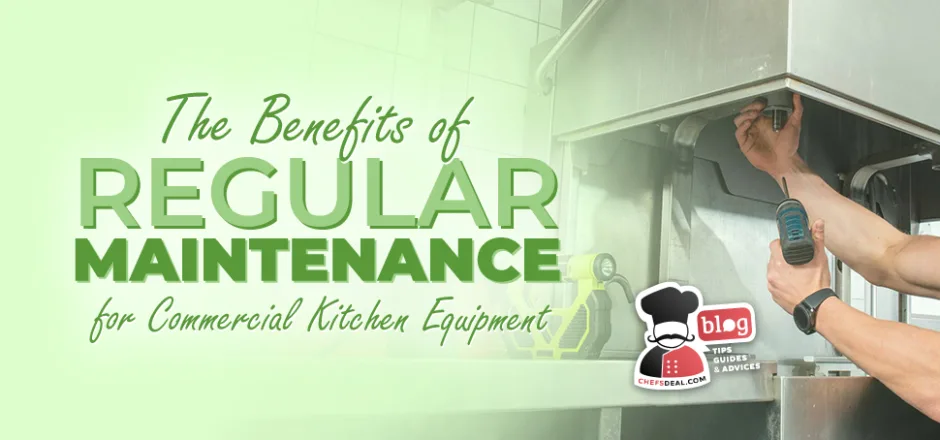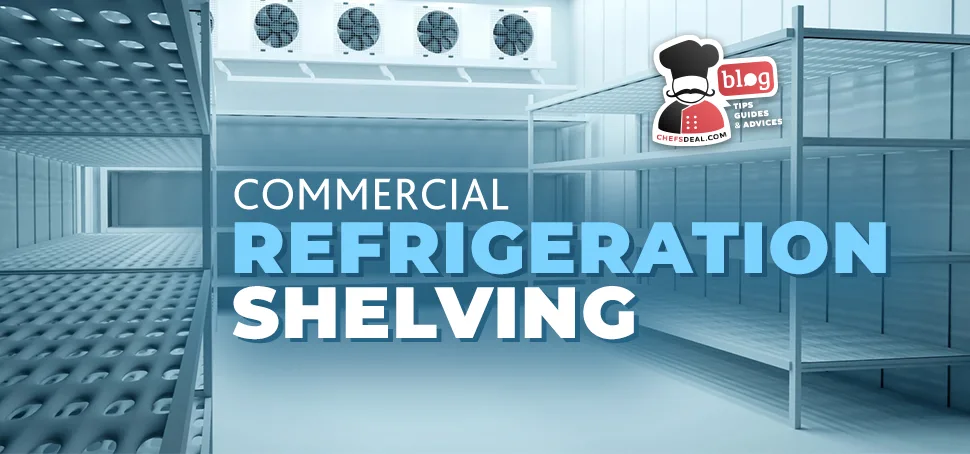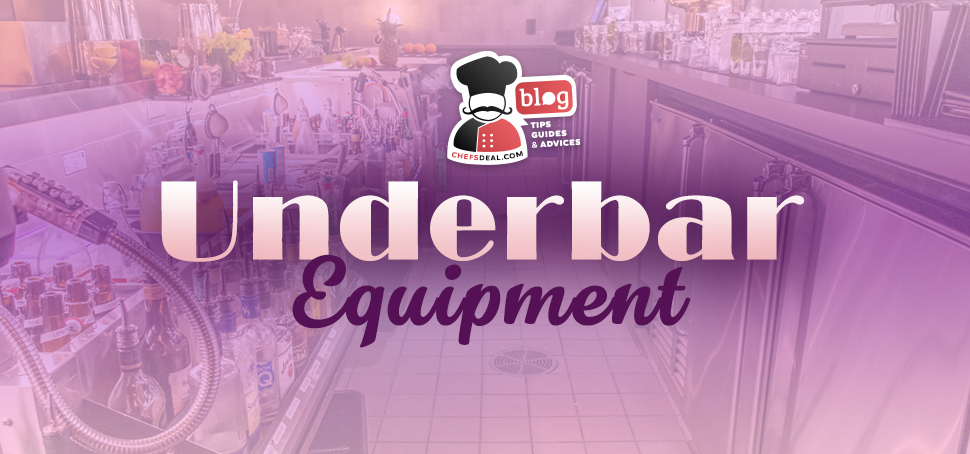Commercial kitchen equipment is the backbone of any foodservice establishment, and their well-being is crucial for the constant and consistent food preparation and service. From freezers, refrigerators, and prep tables to mixers, fryers, ovens, and dishwashers, they are exposed to rigorous conditions of frequent use in commercial settings. The benefits of regular maintenance for commercial kitchen equipment emerge here.
All these tools and appliances will lose their first-day performance due to the tears or wear in parts or piling scales, debris, or oil. Even worse, your devices may fail unless you set a regular schedule of commercial kitchen equipment maintenance to clean, fix, or replace the necessary parts. Hence, it does not matter whether you are already running a food serving business or plant to launch a new one; you should be aware of the benefits of regular maintenance for commercial kitchen equipment and follow the maintenance orders that you can do in-house, and get help from professionals for the major equipment care.
Regular maintenance for commercial kitchen equipment provides 5 main benefits:
- Maximizes lifespan
- Improves energy efficiency
- Prevents cross-contamination
- Enables a reliable temperature control
- Minimize downtown and costly repairs
Enhancing Performance and Efficiency with Regular Maintenance
Performance and efficiency are always a priority in a commercial kitchen to keep up with the incoming orders and daily tasks of a busy kitchen. Improving energy efficiency and sustaining the performance of the appliances can be cited as the primary benefit of regular maintenance of commercial kitchen equipment.
Maximizing Equipment Lifespan
Commercial kitchen equipment is expensive tools, and extending its service life through careful and regular cleaning and fixing is the key to minimizing the total cost of ownership, which refers to all the expenses for an appliance, including the first purchase price, maintenance, and spare parts costs.
Since the initial cost can not be greatly reduced, your focus must be on regular maintenance for commercial kitchen equipment, which can prevent premature equipment replacement and extend the lifespan of your appliances, thereby decreasing the total cost of ownership.
Regularly checking the equipment in your kitchen, frequently cleaning the surfaces, descaling and deliming on a regular basis, calibrating the settings and applying the lubricants when necessary, and cleaning the gaskets ensure consistent performance and extended service life while eliminating the long and expensive repairs which will also cause delays in your food preparation and service.
In addition, scheduled maintenance helps you preserve the equipment’s better condition and enables you to resell it at higher prices to businesses that may be interested in used commercial kitchen equipment.
Improving Energy Efficiency
Energy is among the prime concerns for every commercial foodservice establishment, and investing in energy-efficient and Energy Star-certified equipment enables lower operation costs. However, retaining your savings is not guaranteed just by buying these products, but as stated by Energy Star, it is compulsory for you to establish regular maintenance for commercial kitchen equipment schedule to clean and maintain your equipment for constant energy and money savings.
For instance, cleaning and caring for the gaskets provides higher insulation for refrigerators and freezers by better maintaining the interior chill to prevent energy waste. Furthermore, frequently checking and removing the liming and scaling in commercial dishwashers will help avoid odors and higher electricity consumption. Removing the greasy pile-ups in the fryer wells will help you achieve the benefit from all features of your commercial fryer.
More importantly, compressors of commercial freezers and refrigerators, burners of commercial ranges, heaters of ovens, or motors of mixers may wear and require additional service or fix to operate with maximum performance. However, these components require expertise for maintenance, and you should work with professional companies or experts to ensure efficient maintenance.
Ensuring Food Safety and Compliance
Commercial kitchen equipment regular maintenance is another vital issue for a smoothly operating foodservice business by assuring compliance with official regulations for food and public health safety.
Preventing Cross-Contamination
Cross-contamination refers to the spread of harmful bacteria, particularly from unwashed vegetables, spoiled raw meat, fish, or poultry. Commercial kitchens involve frequent food chopping and preparation processes which may cause contact between these. Unless these products are handled properly, harmful bacteria may infect the other foods and, naturally, the customers. Thus, the Food Safety and Inspection Service of the US Department of Agriculture requires proper and regular cleaning procedures to prevent cross-contamination by sanitizing the dishes and serviceware in well-performing dishwashers.
Reliable Temperature Control
Regular maintenance for commercial kitchen equipment is also significant to prevent temperature fluctuations which will create risks to food safety. Commercial kitchens deal with sensitive ingredients that need to be stored and preserved in refrigerated conditions and are vulnerable to temperature changes. Additionally, raw meat, poultry, and fish must be quickly chilled or heated below or above the danger zone in which the bacterial growth is very fast.
Hence, commercial kitchen equipment is designed with powerful compressors or burners, enhanced insulation, and precise temperature controls for utmost food safety. However, constant use may reduce their efficiency or temperature measurement. Therefore, these units must always be included in the restaurant’s regular maintenance checklists to check the critical parts and calibrate the thermostats to keep them in the best condition.
Minimizing Downtime and Costly Repairs with Regular Maintenance for Commercial Kitchen Equipment
Maintaining and servicing catering equipment is also necessary to streamline your operations and workflow to catch up with the demands of your customers and patrons with the highest standards and fastest service. The most efficient way to prevent such problems in your establishment can only be achieved by discerning the failures before they cause costly and time-consuming repairs.
Early Detection of Issues
A breakdown that happens during your rush hour will damage your service flow and cause stress for you and your staff with additional workload. Therefore, a foodservice establishment must conduct a regular appliance preventive maintenance schedule.

What is Preventative Maintenance for Commercial Kitchens?
Preventive maintenance for restaurants, cafes, caterers, and other commercial kitchens involves routine functionality checks to identify the potential issues that require service, fixing, or replacement, which can end up with major failures or costly repairs. Service provider companies carry out diagnostic tests to evaluate the conditions of the vital parts and components, which will provide them with the necessary information to take preventive measures, ranging from lubricating the parts to fixing or replacing the worn-out components for maximum performance.
These tests and applications eliminate the risk of sudden and unexpected breakdowns that will cause delays in your service or even waste of your precious food stocks in the case of a fault or stoppage due to a malfunctioning part. Moreover, preventive regular maintenance for commercial kitchen equipment also enables earlier detection of worn-out parts, which can be repaired through small fixes, lowering the maintenance costs and allowing you to avoid expensive part replacements.
Choosing a Professional Maintenance Provider for Regular Maintenance of Commercial Kitchen Equipment
Even though some of the tasks, such as cleaning, deliming, or descaling, that regular maintenance of commercial kitchen equipment requires can be handled easily by you, your personnel, or the machine itself through its advanced features, you are recommended to work with a professional commercial preventative maintenance service provider. But, you should be careful about which team you will work with and carefully consider the following issues before deciding on a suitable one.

Expertise and Experience
The first thing you must take into consideration is the service company’s expertise in commercial kitchen equipment. Commercial equipment is highly expensive tools that should not be left to the unpractised hands. Therefore, you are advised to inquire about the certifications of the technicians and engineers who will deal with your equipment.
In addition, regular maintenance of commercial kitchen equipment must be carried out by experienced experts who have prior knowledge of the equipment and the brands they are to service. You should also seek references from the potential service companies to contact for more information about their previous jobs and experiences. In addition to ensuring the authenticity of the information that they provide, this will help you gain more insight and information about the expertise and experience of the company on the machines and brands you have in your kitchen.
As the last issue to discuss with the applicant/candidate companies, you should ask if the company offers any warranty for the repairs they make. This will not only help you understand the expertise of the company but also ensure you are not responsible for additional costs that will arise from the incorrect repairs.
Customized Maintenance Programs
After finding a suitable service company that will provide you with regular maintenance for commercial kitchen equipment, it is imminent to ask the company to create a customized maintenance program that is tailored depending on the specific conditions and needs of your commercial kitchen. A successful plan for regular maintenance of commercial kitchen equipment must include a checklist and schedule for the services to be conducted to optimize the performance of the commercial kitchen equipment.
To Sum Up
Commercial restaurant equipment is the first thing that any foodservice business owner should consider to ensure smooth workflow and service in their establishments. Your personnel can only do their best with well-performing equipment, and your customers can be satisfied only through serving the best dishes at the fastest time by preparing and cooking them with the best equipment.
But you must schedule regular maintenance of commercial kitchen equipment to ensure the highest performance of your equipment as well as ensure compliance with the official regulations. Routinely cleaning the surfaces and deliming the interior parts can help you preserve the outer components of the valuable tools. Still, you must partner with a service company to conduct preventive check-ups and quick repairs for the vital parts to lower downtime and expenses.






